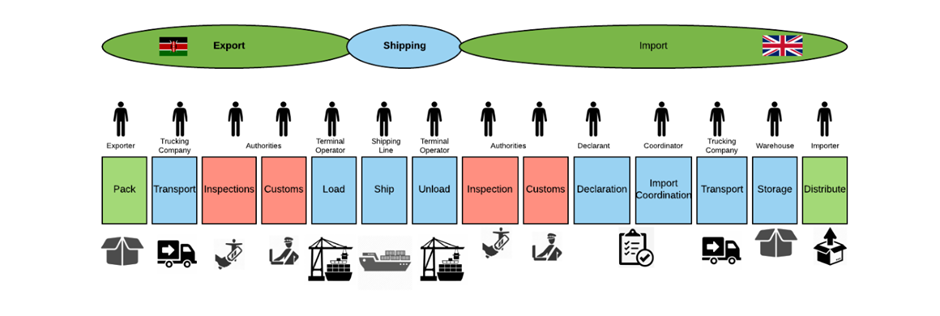
This Valentine’s Day many people will be buying flowers for their significant other without a lot of thought as to where those flowers came from.
International trade, however, has a huge part to play in keeping the UK’s florists stocked with fresh cut flowers.
Where the UK imports flowers from
A little-known fact is the second top import market to the UK for flowers is Kenya, which supplies just over 8 percent of British-sold flowers, or 10,000 tonnes, worth not far off £67 million. Cut flowers account for 25% of all Kenyan imports to the UK.
Alongside the domestic UK trade in flower cultivation, the biggest import market to Britain is the Netherlands, which supplies more than 80 percent of cut flowers, or more than 100 tonnes, worth £500 million, according to Trade Maps.
Digital trade corridor
The Institute of Export & International Trade has been working with donor organisation TradeMark East Africa (TMEA) to implement a ‘digital trade corridor’ between the UK and Kenya to help simplify trade between the two nations.
The initiative, called the ‘UK-Kenya Trade Logistics Information Pipeline’ (TLIP), aims to eliminate documentation and introduce better visibility in the supply chains flowing between the UK and Kenya.
This initiative builds upon on the Kenya-UK Economic Partnership Agreement, which was signed in December 2020.
Blockchain
TLIP's system uses blockchain technology to link all those in a supply chain together, enabling faster logistics and easier trading.
For example, take flowers grown in Kenya which end up being supplied in supermarkets and florists in the UK.
The TLIP system will track the origins of those flowers from the grower to the retailers’ shelves.
‘Blossoming partnership’
Marco Forgione, director general of the IOE&IT, said:
“This Valentine’s Day when you are giving your loved one a beautiful bouquet of flowers, consider the journey they have taken to put that smile on their face.
“Around nine different organisations are involved with the transportation of flowers from Kenya before they enter your home and all of these actions in the supply chain require documentation to move the goods along on their journey.
“The trade corridor we are creating will provide more transparency and enable all actors to view the documentation along its journey. This is so important because with full traceability in a supply chain you will gain access to customs easements, effectively reducing your time to export by 30% and the cost by about 40%.
“Even more importantly TLIP will bring UK and Kenyan trade closer together to continue this blossoming partnership.”

Cutting red tape
Simon Cromey, Co-Owner of All Seasons Flowers, a UK flower importer and distributor said:
“Anything that can help speed up the flow of flowers into the UK can only be a positive thing. We have been importing from Kenya for many years and TLIP will help cut red tape around documentation and leave us more time distribute flowers to UK retailers.”
UK-Kenya trade
UK exports to Kenya in 2021 were worth £530 million and imports from Kenya totalled £579 million.
The TLIP project aims to increase trade for both countries and will help create greater visibility within supply chains and simplify the facilitation of trade between the UK and Kenya.
The overall aim of the TLIP initiative is to reduce logistical time constraints for businesses by around 40%, reduce the cost of compliance by 20% - potentially worth an initial saving of up to £36m to UK exporters.



